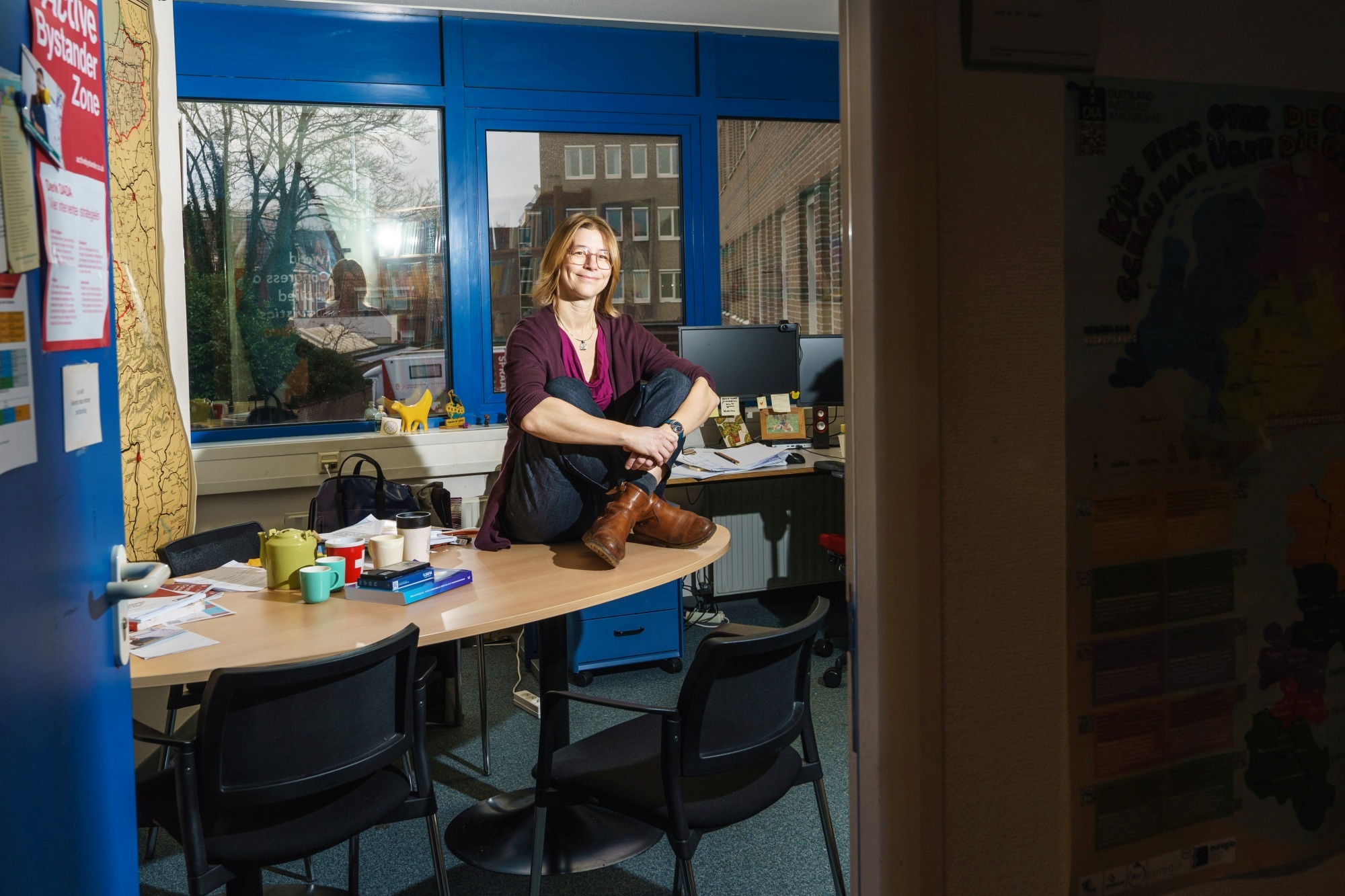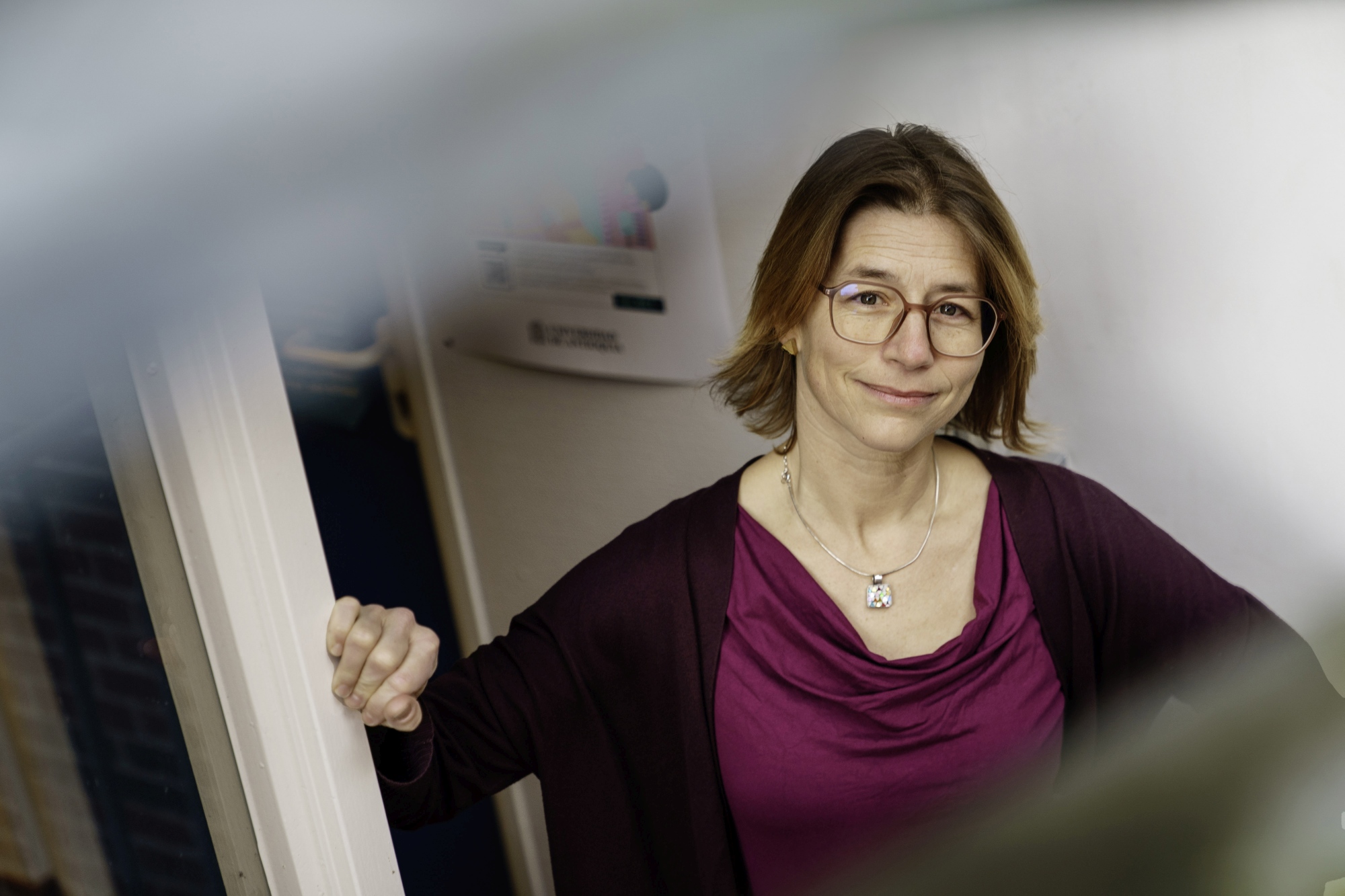Language as a Gateway to a New World
In language education, do not limit yourself to just Dutch and English; instead, embrace multilingualism. That is the core message of multilingual professor of Second Language Acquisition, Prof Marije Michel. “We urgently need people who deeply understand the languages, cultures, and communities of the countries surrounding us.”
Text: Lieke van den Krommenacker | Photos: Reyer Boxem

Aus, bei, mit, nach, seit, von, zu, gegenüber, entgegen, an ... vorbei: plus drei! Anyone who has ever studied German in Dutch high school will likely recognise these prepositions and related memory aids for the correct case. Unfortunately, for some, German may have been reduced to 'that language with all those complicated cases'. A waste and unnecessary, says Professor of Second Language Acquisition, Marije Michel. She studied Dutch and German, also speaks English, French, and Italian, and teaches at the European Languages and Cultures programme at the University of Groningen. "Language is the gateway to a new world," says Michel. "And it entails so much more than just memorising words and grammar."
Michel is dismayed by the emphasis placed on these aspects in much language education. "Learning a language means appropriating another cultural identity. To do that, you need to spark interest: watch movies, listen to the radio, demonstrate how countries, languages, and societies are interconnected."
Inaugural lecture in eight languages
On 16 February, she will give her inaugural lecture. Michel made a special request to the rector to be allowed to deliver it in eight languages, unlike choosing between one of the usual two: Dutch or English. In addition to Dutch and English, her plea will be partly delivered in French, German, Spanish, Italian, Swedish, and Russian - all the languages offered in the European Languages and Cultures programme. Her message: let's not confine ourselves to just two languages, as is often the case with Dutch and English.
Michel says, "There is a wide range of linguistic and cultural insights you can gain by looking at different languages and cultures. This is not only important for broadening your own perspective but also for us as a society. We live in a complex time where there is a tendency towards nationalism. Focusing on your own origins and culture has its merits, but I believe you can only truly understand your own language and culture by also looking at others. This teaches you that different is not strange or weird, but rather interesting."
Practice, practice, practice
Michel's love for languages came naturally in her family. She grew up with Dutch parents in an international family in Switzerland. Her mother was a French teacher, her father remarried an Australian. For her studies, she moved to the Netherlands and then to Berlin. Her husband is Italian, and they lived together in England for a while. She experienced firsthand what much research confirms: to learn a language, you must immerse yourself. And practice, practice, practice.
But this can only happen if there is enough exposure. "The fact that so many people in the Netherlands are proficient in English is not necessarily due to education. It is also because there is so much English in the media. Similarly, there is an older generation in the Netherlands who are very good at German because they used to watch more German television. Because that was all you could get."

Dusty image
Michel is convinced of one thing: with the Dutch focus on all things Anglo-Saxon, we will not get far. English is no longer the only globally significant language. "We urgently need people who deeply understand the languages, cultures, and communities of the countries surrounding us. Here, we train people in Russian language and culture. People who can read local newspapers and Telegram messages. And by that, I do not just mean reading but understanding what such messages convey."
As passionate as Michel is in conveying her argument, the public’s enthusiasm for certain languages, such as her beloved German, is lukewarm at best. The interest is low, the shortage of teachers is significant, and languages are disappearing from curricula. Michel and two colleagues from other universities recently shared their concerns about these developments and the dusty image of language and culture studies in an opinion piece in NRC Handelsblad. "Those who do not receive high-quality language education at school do not choose to study languages. And those who do not study the language do not become teachers - the vicious circle is complete," the trio stated.
Beer and sausage
Does Michel have an explanation for this lack of interest? "I think we are not very good at supporting and promoting a positive view of certain cultures and attitudes towards languages like German in high schools. Look, if someone says they are going to study French, you immediately think: oh la la, Paris, baguettes! But if you say you're going to study German, you think of something else." Like what? "Well, beer and sausage? Those kinds of things. And it is very unfortunate, but there is also simply a historical legacy that keeps resurfacing, one that does not do justice to the current German-speaking countries and their important role in Europe."
The good news is: this attitude towards and culturally determined perceptions of languages and cultures can be influenced. Provided that education focuses on content. And for that, we primarily need not just prepositions and grammar but rather pop phenomena and (former) influencers like Joost Klein. Michel says, "He now has a huge hit in Germany, which immediately links you to that country. And he also speaks Frisian, Dutch, and English. Use these examples in your lessons, connect with current events, and be creative. Many people, especially here in the region, don't realise how multilingual they are. A local example like that is engaging."
Another thing: emphasise what students can do and what goes well. "In language education, we often focus heavily on pointing out what people do wrong," Michel observes. "So you get a text back, and it is all red. And in some schools, you even get points deducted for each mistake. So you could end up with a negative grade. Well, then you are not going to write another text next time."
An ideal place to develop multilingual skills
European Languages and Cultures welcomes about one hundred to one hundred twenty new students annually. They choose a main language and a profile: culture and literature, language and society, or politics and society. This last direction, and therefore the option to study politics with, for example, French or Swedish, makes the programme in Groningen unique. And the students, potentially, as well. Michel says, "This programme is an ideal place to develop your multilingual skills. So that once you graduate, you are not only proficient in Dutch and English but also stand out as you speak an additional language."
This does not stop at writing a thesis in 'beautiful Russian, Swedish, or French,' Michel concludes. "Our students lead entire conferences in their main language. For French, one of the assignments is always to write advice to the president. One of the students wrote such a good letter that she sent it to Macron." Superbe, or what?
More news
-
14 February 2026
Tumor gone, but where are the words?
-
19 January 2026
Digitization can leave disadvantaged citizens in the lurch
